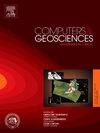基于监督学习的CO2储气模拟中井事件处理加速的混合牛顿法
IF 4.4
2区 地球科学
Q1 COMPUTER SCIENCE, INTERDISCIPLINARY APPLICATIONS
引用次数: 0
摘要
二氧化碳的地质储存是有效的碳捕获和储存政策的重要工具。数值模拟提供了模拟CO2注入部位行为的多相流方程的解。然而,多孔介质中流体流动的数值模拟在计算上要求很高:如果我们想要准确地模拟复杂的物理过程,那么为了模拟一个大型二氧化碳储层的注入场景,在HPC集群上可能需要花费长达几个小时的时间。当执行大量模拟时,这成为一个限制问题,例如在“历史匹配”过程中。井的事件,如开井和关井,由于其对未知压力和饱和度的即时影响,导致了重要的数值困难。这通常迫使时间步长大幅度减少,以便能够解决由连续数学模型离散化引起的非线性方程组。然而,在模拟中,这些特定的井事件在空间和时间上具有相对相似的影响。我们提出了一种概念验证方法,通过使用基于机器学习的非线性预处理来减轻地下CO2储存数值模拟过程中井事件的影响。我们通过使用监督学习直接在二次收敛域预测牛顿方法的初始化来补充标准的全隐式求解器。更具体地说,我们用隐式求解器获得的线性近似代替压力初始化,并使用傅立叶神经算子(FNO)来预测饱和初始化。此外,我们提出了一个开源Python框架,用于进行油藏模拟和集成机器学习模型。我们将我们的方法应用于两个测试用例,这些测试用例来自于盐水含水层中实际的二氧化碳储存基准。对于第一个测试用例,我们将处理井开所需的牛顿迭代次数减少了53%,即需要解决的线性系统的数量,对于第二个测试用例,我们减少了38%。本文章由计算机程序翻译,如有差异,请以英文原文为准。
Hybrid Newton method for the acceleration of well event handling in the simulation of CO2 storage using supervised learning
Geological storage of CO2 is an essential instrument for efficient Carbon Capture and Storage policies. Numerical simulations provide the solution to the multi-phase flow equations that model the behavior of the CO2 injection site. However, numerical simulations of fluid flow in porous media are computationally demanding: it can take up to several hours on a HPC cluster in order to simulate one injection scenario for a large CO2 reservoir if we want to accurately model the complex physical processes involved. This becomes a limiting issue when performing a large number of simulations, e.g. in the process of ‘history matching’. Well events, such as opening and closure, cause important numerical difficulties due to their instant impact on the pressure and saturation unknowns. This often forces a drastic reduction of the time step size to be able to solve the non-linear system of equations resulting from the discretization of the continuous mathematical model. However, these specific well events in a simulation have a relatively similar impact across space and time. We propose a proof of concept methodology to alleviate the impact of well events during the numerical simulation of CO2 storage in the underground by using a machine-learning based non-linear preconditioning. We complement the standard fully implicit solver by predicting an initialization of Newton’s method directly in the domain of quadratic convergence using supervised learning. More specifically, we replace the initialization in pressure by a linear approximation obtained through an implicit solver and we use a Fourier Neural Operator (FNO) to predict the saturation initialization. Furthermore, we present an open-source Python framework for conducting reservoir simulations and integrating machine-learning models. We apply our methodology to two test cases derived from a realistic CO2 storage in saline aquifer benchmark. We reduce the required number of Newton iterations to handle a well opening by 53% for the first test case, i.e required number of linear system to solve and by 38% for the second test case.
求助全文
通过发布文献求助,成功后即可免费获取论文全文。
去求助
来源期刊

Computers & Geosciences
地学-地球科学综合
CiteScore
9.30
自引率
6.80%
发文量
164
审稿时长
3.4 months
期刊介绍:
Computers & Geosciences publishes high impact, original research at the interface between Computer Sciences and Geosciences. Publications should apply modern computer science paradigms, whether computational or informatics-based, to address problems in the geosciences.
 求助内容:
求助内容: 应助结果提醒方式:
应助结果提醒方式:


